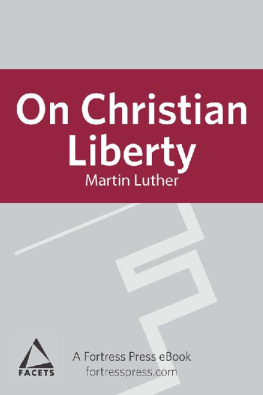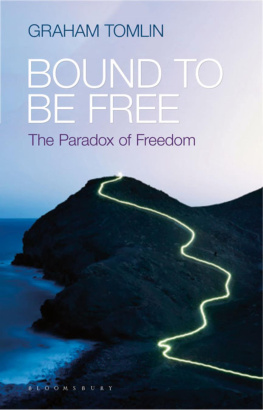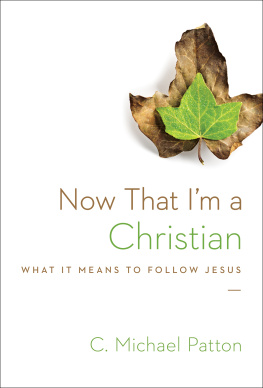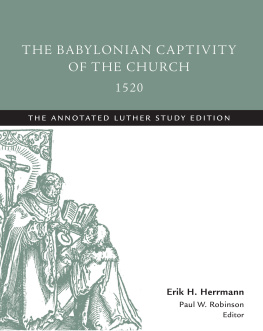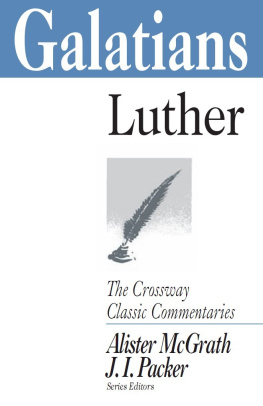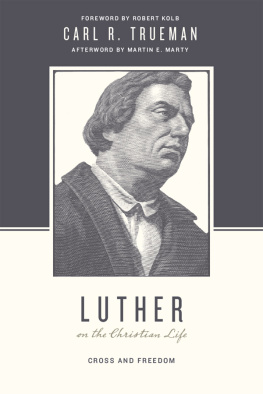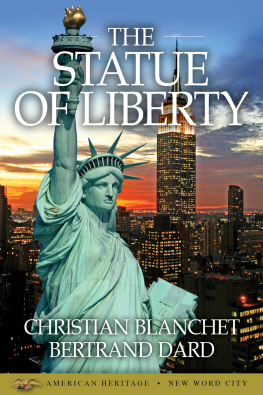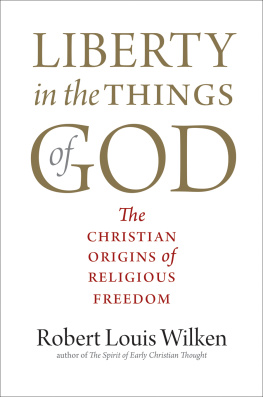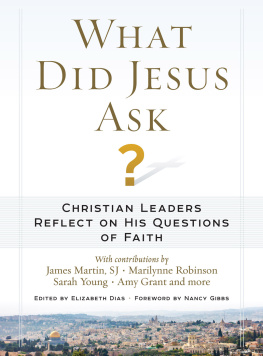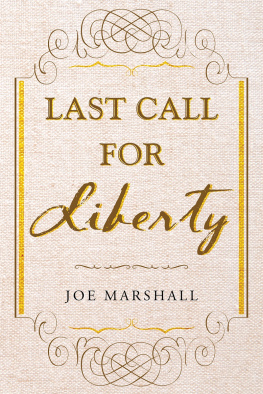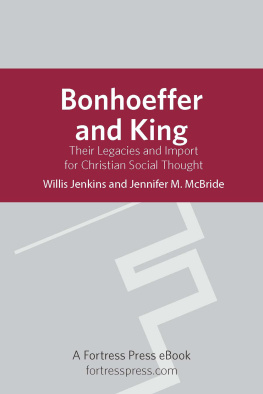On Christian Liberty
Martin Luther
Translated by W. A. Lambert
Revised by Harold J. Grimm
Fortress Press
Minneapolis
ON CHRISTIAN LIBERTY
Copyright 2003 Augsburg Fortress. All rights reserved. Except for brief quotations in critical articles or reviews, no part of this book may be reproduced in any manner without prior written permission from the publisher. Write: Permissions, Augsburg Fortress, Box 1209, Minneapolis, MN 55440.
This work is excerpted from volume of Luthers Works, edited by Harold J. Grimm and Helmut T. Lehmann, 1957 Fortress Press.
Introduced by Roy A. Harrisville, III
ISBN: 0-8006-3607-4
Contents
M artin Luther stands as one of the most significant figures in Western history. His distinction as the father of the Protestant Reformation is augmented by his innovative use of new technology (the printing press), his translation of the Christian Bible into the vernacular, and his impact upon European society. Indeed, his legacy continues to this day in the Lutheran denominations around the world and the respect his theological formulations enjoy in the whole Christian church.
Born in 1483 to middle-class parents in the area of Saxony in eastern Germany, he became an Augustinian monk, a priest, a professor of biblical literature, a reformer, a husband and father. He died in 1546 after having witnessed the birth of a renewal movement that would result in a profound shift in faith, politics, and society. Not all results would prove beneficial, and much suffering would come from those who opposed and those who supported his ideas. Not until the end of the Thirty Years War in the next century would his followers and his enemies lay down their arms.
He has been praised and vilified for what he began and preached and wrote. Some of it must be judged by the context of his day, some of it must be criticized by the lights of his own beliefs, and some of it shines with the luster of divine reflection. However his work is judged, it cannot be avoided, for his impact upon church and society endures in the faith and hope of millions.
Martin Luthers treatise, or written argument, On Christian Liberty (The Freedom of a Christian), remains one of the most influential of his many works. In 1517 an obscure professor in the town of Wittenberg issued a list of Ninety-five Theses, or propositions, that called for repentance, an end to the sale of indulgences (expensive pieces of paper that assured them or a deceased relative of relief from punishment after death for sin), and a church council to debate such matters. By 1520 Luthers views had been published widely in such treatises as The Address to the German Nobility and On the Babylonian Captivity of the Church, both written in that year and both attacking certain aspects of the church, including the papal see (the seat of a bishops office or authority). He had appeared in two meetings, one in Augsburg (1518) and the other at Leipzig (1519) to defend his views.
Now on September 6, 1520, Luther had been persuaded to write On Christian Liberty at the request of his mentor and head of his monastic order in Germany, Johann von Staupitz, and his successor, Wenceslaus Link. Both men had been prevailed upon by the popes emissary, Karl von Miltitz, to urge Luther to write a conciliatory letter to Pope Leo X in a final effort to prevent a split in the church and assure the Pope that Luther had not attacked him personally. Miltitz met with Luther himself on October 12 to press the case. By this time, however, the Pope had issued an ultimatum on June 15 that if Luther did not renounce his views within sixty days, he and all his followers would be excommunicated from the church.
Luther agreed to write the letter to Pope Leo (included at the end of this book) and also a devotional book to accompany it. Both were penned in Latin, as was customary in the church of those days. If the Pope ever read the letter or the treatise, he would have found in the treatise a succinct and clear expression of Luthers evangelical theology. The Christian, Luther declared, is perfectly free from sin, death, and the devil through faith in Christ. At the same time, this does not give license to the Christian to act as he or she wishes, but rather bestows on believers the marvelous opportunity to serve their neighbors. For that is what God, in Christ, has done for his children.
Martin Luthers Treatise
[The Freedom of a Christian]
M any people have considered Christian faith an easy thing, and not a few have given it a place among the virtues. They do this because they have not experienced it and have never tasted the great strength there is in faith. It is impossible to write well about it or to understand what has been written about it unless one has at one time or another experienced the courage which faith gives a man when trials oppress him. But he who has had even a faint taste of it can never write, speak, meditate, or hear enough concerning it. It is a living spring of .
As for me, although I have no wealth of faith to boast of and know how scant my supply is, I nevertheless hope that I have attained to a little faith, even though I have been assailed by great and various temptations; and I hope that I can discuss it, if not more elegantly, certainly more to the point, than those literalists and subtle disputants have previously done, who have not even understood what they have written.
To make the way smoother for the unlearnedfor only them do I serveI shall set down the following two propositions concerning the freedom and the bondage of the spirit:
A Christian is a perfectly free lord of all, subject to none.
A Christian is a perfectly dutiful servant of all, subject to all.
These two theses seem to contradict each other. If, however, they should be found to fit together they would serve our purpose beautifully. Both are Pauls own statements, who says in ].
Let us start, however, with something more remote from our subject, but more obvious. Man has a twofold nature, a spiritual and a bodily one. According to the spiritual nature, which men refer to as the soul, he is called a spiritual, inner, or new man. According to the bodily nature, which men refer to as flesh, he is called a carnal, outward, or old man, of whom the Apostle writes in .
First, let us consider the inner man to see how a righteous, free, and pious Christian, that is, a spiritual, new, and inner man, becomes what he is. It is evident that no external thing has any influence in producing Christian righteousness or freedom, or in producing unrighteousness or servitude. A simple argument will furnish the proof of this statement. What can it profit the soul if the body is well, free, and active, and eats, drinks, and does as it pleases? For in these respects even the most godless slaves of vice may prosper. On the other hand, how will poor health or imprisonment or hunger or thirst or any other external misfortune harm the soul? Even the most godly men, and those who are free because of clear consciences, are afflicted with these things. None of these things touch either the freedom or the servitude of the soul. It does not help the soul if the body is adorned with the sacred robes of priests or dwells in sacred places or is occupied with sacred duties or prays, fasts, abstains from certain kinds of food, or does any work that can be done by the body and in the body. The righteousness and the freedom of the soul require something far different since the things which have been mentioned could be done by any wicked person. Such works produce nothing but hypocrites. On the other hand, it will not harm the soul if the body is clothed in secular dress, dwells in unconsecrated places, eats and drinks as others do, does not pray aloud, and neglects to do all the above-mentioned things which hypocrites can do.
Next page
